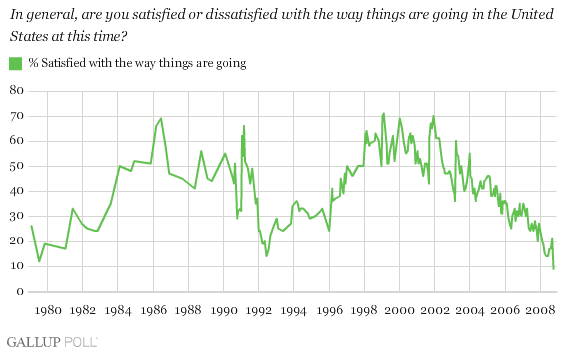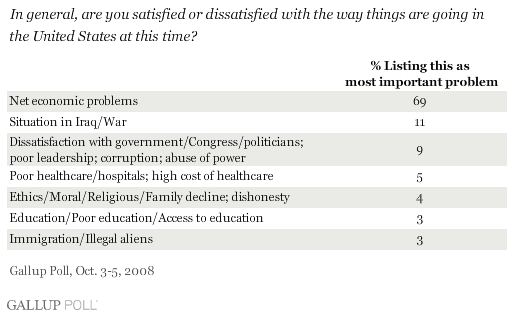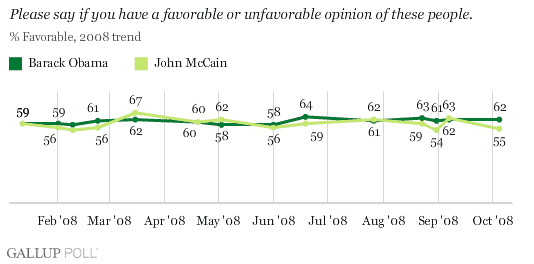PRINCETON, NJ -- Presidential candidates Barack Obama and John McCain are set to meet for the second presidential debate in Nashville Tuesday night at a time when only 9% of Americans are satisfied with the way things are going in the United States -- the lowest such reading in Gallup Poll history.

The previous low point for Gallup's measure of satisfaction had been 12%, recorded back in 1979, in the midst of rising prices and gas shortages when Jimmy Carter was president. Gallup has recorded a 14% satisfaction level at several points -- once in the senior Bush's administration in 1992, and several times earlier this year.
The reason for Americans' extraordinarily low level of satisfaction is straightforward: the economy. Asked in the weekend Gallup Poll to name the most important problem facing the country today, almost 7 in 10 Americans mentioned some aspect of the economy, far ahead of any other problem mentioned.

Images of the Candidates
Despite the fact that Obama has led McCain by a significant margin in Gallup's tracking of presidential preferences for 10 days now, the two presidential candidates continue to have positive images, with McCain's a little less positive than Obama's.

McCain's 40% unfavorable rating is slightly higher than he has recorded so far this year, but his 55% favorable rating is no worse than it was in late August (after the Democratic National Convention) and earlier in the year. Similarly, Obama's favorable and unfavorable ratings are neither better nor worse than they have been at previous points over the last several months.
Bottom Line
Tuesday night's debate in Nashville will include questions asked by a representative group of uncommitted voters recruited from the Nashville area, as well as from Americans who submitted questions on the Internet. There is little doubt that these average citizens will be an unhappy bunch, representing as they do an American population that is more dissatisfied with the state of the union than at any point in the last 29 years.
How well the two candidates respond to these dissatisfied citizens Tuesday night -- and how well they are able in the remaining weeks of the campaign to convince voters that they have remedies for the bad situation the country finds itself in -- may go a long way toward determining the ultimate winner on Nov. 4.
Survey Methods
Results are based on telephone interviews with 1,011 national adults, aged 18 and older, conducted Oct. 3-5, 2008. For results based on the total sample of national adults, one can say with 95% confidence that the maximum margin of sampling error is ±3 percentage points.
Interviews are conducted with respondents on land-line telephones (for respondents with a land-line telephone) and cellular phones (for respondents who are cell-phone only).
In addition to sampling error, question wording and practical difficulties in conducting surveys can introduce error or bias into the findings of public opinion polls.
